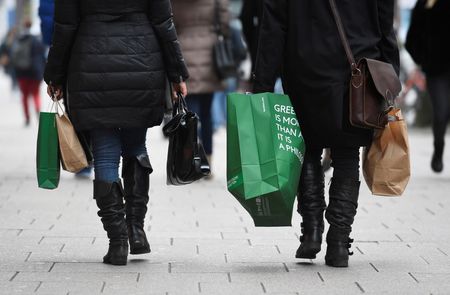By Rachel More
BERLIN (Reuters) -German consumer sentiment is set to improve again slightly heading into June but households’ hesitancy to spend remains an obstacle to any stronger recovery in Europe’s biggest economy, a survey indicated on Tuesday.
The consumer sentiment index, published by GfK market research institute and the Nuremberg Institute for Market Decisions (NIM), rose by 0.9 points month on month to -19.9 points, just below an average forecast of -19.8 from analysts polled by Reuters.
The rise was driven by improved income prospects in May, which factors into the survey’s assessment of consumer climate for the coming month. However, a declining willingness to buy and an increased willingness to save had a dampening effect.
It was the overall indicator’s third monthly increase, but the rate of recovery slowed heading into June.
“The level of consumer sentiment remains extremely low, and consumer uncertainty remains high,” said Rolf Buerkl, NIM’s head of consumer climate, pointing to tariff and stock market turbulence and the prospect of a historic third year without growth in Germany.
“In view of the general economic situation, people seem to think it advisable to save,” Buerkl added.
Germany’s new government has promised to drastically ramp up investment and stimulate the economy after two years of contraction.
But an unpredictable tariff row with the United States threatens Germany’s export-driven economy and prompted the government to scrap its growth forecast for 2026.
JUN 2025 MAY 2025 JUN 2024
Consumer climate -19.9 -20.8 -21.0
Consumer climate components MAY 2025 APR 2025 MAY 2024
– economic expectations 13.1 7.2 9.8
– income expectations 10.4 4.3 12.5
– willingness to buy -6.4 -4.9 -12.3
– willingness to save 10.0 8.4 5.0
NOTE – The survey period was from May 1-12, 2025.
An indicator reading above zero signals year-on-year growth in private consumption. A value below zero indicates a drop compared with the same period a year earlier.
According to GfK, a one-point change in the indicator corresponds to a year-on-year change of 0.1% in private consumption.
The “willingness to buy” indicator represents the balance between positive and negative responses to the question: “Do you think now is a good time to buy major items?”
The income expectations sub-index reflects expectations about the development of household finances in the coming 12 months.
The additional business cycle expectations index reflects respondents’ assessment of the general economic situation over the next 12 months.
(Reporting by Rachel MoreEditing by Gareth Jones)









